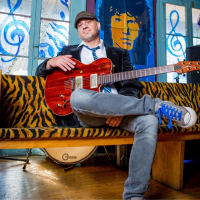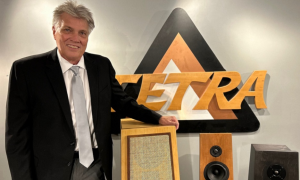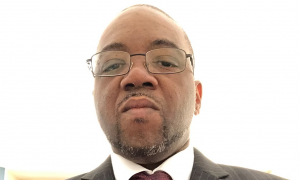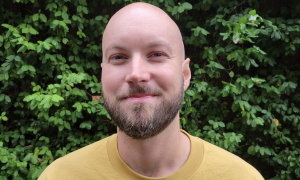Home » Jazz Articles » Chats with Cats » The Musician / Entrepreneur: Eddie Roberts
The Musician / Entrepreneur: Eddie Roberts

Courtesy Jason Melino
I never wanted Color Red to be genre specific like just a funk label. But, I was trying to take different musical genres and produce them in a similar way.
—Eddie Roberts
In this installment I interviewed a prime example of the musician/entrepreneur. Eddie Roberts, best known as the guitarist and producer of The New Mastersounds, has also acted as their manager and booking agent. Besides being a creative musician he is a savvy businessman. His latest endeavor is a Denver-based label called Color Red which has shrewdly adapted to the models of the new music business. He has tapped into a blossoming music scene and has the creative and business acumen to be a major force within it and to help propel it further.
About Eddie Roberts
Eddie Roberts started his music career in 1989 when, at age eighteen, he left his Welsh homeland to study jazz at Leeds College of Music. More interested in live performing and getting his own thing going than in college work, he quickly rooted out the best players in town and set up his first band, The Jazz Mailmen, dedicated to playing the golden era of Art Blakey's Jazz Messengers.Around 1991 Eddie's love for Grant Green inspired him to put a Hammond-based line up together. With the sound of Big John Patton, Lou Donaldson and Ivan Boogaloo, his band The Eddie Roberts Organisation toured the U.K. and managed to get its first European dates. In 1999 Eddie's focus shifted towards deep funk, and hence The New Mastersounds were born from performing a mix of Eddie's quirky The Meters-inspired funk ditties and covers of Jimmy McGriff and Grant Green tunes around Leeds and Manchester. 2001 and 2002 saw some heavy international touring for the extended eight-piece band.
In April 2003 the original New Mastersounds quartet (bass, drums, guitar, Hammond) took matters into their own hands and set up a dedicated label for the band, One Note Records, with drummer Simon Allen at the helm. Their second album, Be Yourself was written, recorded and mixed over the summer and released in the U.K. that October.
In 2007 Eddie paid his first visit to New Orleans with The New Mastersounds. The band played three shows over the first weekend of New Orleans Jazz and Heritage Festival, but while the others went home, Eddie stayed on for an extra week and found himself guesting with a host of jazz and funk artists at late-night shows around the city.
He later moved to San Francisco in 2010 to further his music career. During the next three years, as well as touring extensively with The New Mastersounds in USA, Europe, and Japan, he started managing the band as well as putting together a new band, Eddie Roberts' West Coast Sounds. He also started a non-profit, the Payback 501c3, to raise money for youth experiencing homelessness in S.F. and hosted an annual event at the Great American Music Hall.
In 2013, Eddie decided to follow his love for New Orleans funk and moved to the Big Easy. New Orleans embraced Eddie and lots of opportunities ensued for the next two years until he moved, yet again, to Denver, CO and fully embraced its lively music scene. He set up Color Red Music, a record label, production studio, and multimedia platform dedicated to producing and releasing original music on a weekly basis. Since then, the release catalog has grown to several hundred tracks.
2019 saw the twenty-year anniversary of The New Mastersounds, along with an extensive world tour and the release of their 18th studio album Shake It, which featured a new addition to the band, Atlanta-based vocalist Lamar Williams Jr..
All About Jazz: You've moved around a lot even here within the States. Is that something you set out to do or have you been looking for something in particular?
Eddie Roberts: I started touring with The New Mastersounds in the U.S. in 2004 so I got a pretty good view of the country. I pretty much played every major city within those first few years. San Francisco always jumped out to me as a place I wanted to be so that was my first port of call. That's where I lived from 2010-2013. Then, I moved to New Orleans for obvious reasons. You know, I was playing every Jazz Fest and playing like fourteen shows in ten days and all that crazy stuff. So I was like, I've got to do a stint here.
While I was living there I actually toured through Colorado and met my, now, wife. She was living in Denver and was like, "should I move to New Orleans or do you want to move to Denver?" I figured I'd probably die of liver failure if I stayed in New Orleans [laughs]. Those shows go all night and it's too hot in the day to even leave my house. So, I did two years down there and then moved to Denver. I hadn't really thought of Denver before that even though the rest of my band always said that if they ever moved to America they'd move to Denver because they loved it so much.
It wasn't until I committed to moving here that I realized how many friends I had here, what a thriving music scene was going on here, and how much potential there was of making a living as a playing musician. New Orleans was kind of tough. Especially as Denver started booming in the last ten years you find yourself playing a Tuesday night show and there are three or four hundred people there and you're like, "alright, this is actually happening."
AAJ: I have to be honest, I'm surprised to hear that you're having an easier time making a living in Denver than in New Orleans.
ER: New Orleans is a very small city. Outside of the big festivals it's tough getting an audience out. Whereas, what happened with Denver being the first city to legalize, started an influx of people. And, the kind of people that moved here are an alternative workforce who weren't just stuck to nine to five. So, on Monday, Tuesday, and Wednesday, people are going out and watching music because they're not restricted. I feel that has to have an impact on what happened here.
And, you have the outdoor lifestyle which does bring that alternative kind of person. I think over the last ten years it's been the fastest growing city for a certain age group, 25-35, or something like that, which is prime audience.
AAJ: How have you managed to keep the Mastersounds going for so long considering that you're all spread out?
ER: So, it's officially twenty-four years since we've been around. We started in 1999 but the last time we played in the U.S. was January 2020. In fact, we played in Japan right after that. It was the last weekend in January and then the world shut down right after that. I didn't even see those guys until I met up with them in Iceland in November 2021 which is when we made the new album that came out last September.
We played some European shows in 2022. We played a reunion show in Leeds for our drummer's 50th birthday. We played a big show in Tel Aviv. But, yeah, we probably only played seven shows last year [laughs].
AAJ: But, you still managed to make a record.
ER: Yeah, there's so much history with us as a four-piece band that has been together so long. The only difference is the keys player changed. Joe Tatton replaced Bob Birch in like 2006 or 2007 so he's the new kid [laughs] even though it's been nearly twenty years.
So we've got so much history and we were doing two hundred shows a year, mostly U.S. based. Two guys still live in the U.K., the bassist Peter Shand lives in Minorca so, yeah, we're definitely spread out. We've been doing work with Lamar Williams Jr. as well. He's a vocalist out of Atlanta and his dad was Lamar Williams of the Allman Brothers Band. He's done the last two albums.
So, making the album in Iceland after not having seen each other we had some concerns. Is the chemistry still there? But, of course the chemistry was there. With so much history, you get in the room and as soon as you play the first note you're like, "oh, there it is!"
So, at this point, we're not really concerned about that. It's now just kind of picking and choosing what we do and when we do it. Everyone is independently busy doing their own things as well and it's just really nice to get together and chug out the hits. It's fun.
AAJ: Tell me about Color Red. Is it a label in the traditional sense?
ER: I wouldn't call it a label in the traditional sense. I'm not even sure what that is at this point.
AAJ: I guess where you sign an act, make a record, and help promote it.
ER: Yeah, in that aspect I guess it is. The only difference is we don't tend to sign acts. We do it project based. Again, one of the reasons I started it was because I was in Denver and saw all of these collaborations happening. A lot of people were coming through town and playing with each other and nothing was getting captured. There was no outlet for it.
I would tell people I live in Denver and they would say, "Denver, why?" There's actually a lot going on. Now it's changed. When I say Denver people say, "Oh Denver, cool. Yea, Denver is great.." It's funny that, even five years ago, people hadn't caught on to what was going on here. I don't think anything was really coming out of Denver so, unless you were here, you wouldn't know it.
So, that was one of the reasons that I wanted to start this. And, the model was more collaborative. We built a studio a mile from downtown Denver.as a tape studio. We go to tape which creates... . What's the word? Umm.. It makes people perform when you're recording to tape. I'd tell them that tape is really expensive and they need to get it right the first time [laughs]. The adrenaline pumps a little more.
AAJ: Do you later dump it into digital?
ER: Oh yeah, totally. So, especially in the first couple of years, we would see who's coming through town at the Ogden Theatre, or Cervantes' Masterpiece Ballroom, or the Fillmore Auditorium and hit them up. I'd say, "hey, do you want to come and record in the studio? We have accommodations as well." So, people would come through and stay with us. Or, just come that afternoon and cut a couple of tracks.
So, it's certainly not signing bands. It's creating content. But not like some of those live Tiny Desk kind of things. This is still more produced.
We set about releasing a track every week which we have successfully done since we launched in 2018. That's how we were getting a lot of content. We built the studio six months before we launched so we already had a bunch of music produced before we did the launch. Then, we just had this consistent turnover of artists coming through and doing these non-exclusive deals. We'd do a deal just based on those two or four tracks that they make.
That was the model until people stopped touring over 2020 and 2021. But, we had a lot of stuff in the can already so that was cool. Then, we started doing a bit more of a traditional licensing music from people. People would create some tracks or an album and would approach us with it and say, "do you want to put our album out?" We started doing a bit more of that, more album and licensing based.
Now that touring has come back it's more of a hybrid. We've been focusing a lot on Colorado based musicians trying to elevate the younger scene that's happening. Now it's becoming a hybrid of investing time into some bands and still licensing some stuff. But, we're very active at the studio again now.
AAJ: Pre-Covid, everything that was released came from the Color Red studio. Is that right?
ER: Yeah, the first couple of years. And, we're getting back to that more. We're focusing more on the Color Red-produced than the Color Red-licensed.
AAJ: I notice a wide variety of genres represented by Color Red, not just the jazz/funk thing of which you're known for. What do you look for in an artist to determine whether you want to work with them?
ER: Do we like the music first off? I never wanted Color Red to be genre specific like just a funk label. But, I was trying to take different musical genres and produce them in a similar way. Again, using the tape and funk production to do some Americana, reggae, or whatever. I think there's a theme that flows through it all. Everything, at least, has got soul.
The artwork is consistent as well. We have in house art by Chris Ball which gives it cohesive branding. We're taking the inspiration from Blue Note Records where you'd see a Blue Note record, you didn't know the artist, but you bought it because you knew it was going to be great. There's that element of putting our seal of approval on things.
AAJ: Are you pressing physical CD's and/or vinyl?
ER: We do vinyl, yeah. We've done a lot of vinyl. I've started this little Thursday night DJ residency. I've never been a DJ in my life. We have about thirty albums, now, that are released in physical form. So, I go down to my local bar and just play Color Red records for like four hours on a Thursday night. We invite the artists down and do like an artist drop-in so if anyone wants to ask questions about publishing or details about their release, we'll do that in the afternoon and then just start spinning Color Red records for the rest of the evening. It's really fun.
Every record I'm putting on I have a connection to. I'm either on it, or I produced it, or they're buddies of mine, or I said yes to it. It's actually fun for me to get an overview of what we're doing and present that to the public
AAJ: What's your opinion of the current climate for releasing music and what strategies have you found to be successful?
ER: Everyone is banging on about playlists these days. The playlist is king. And, it's kind of true. It's how booking agents are looking at things now, play counts. Everyone is about the numbers. Everyone is like, "well, we looked at the numbers and you could do with some more numbers." Whether it's followers, playlists, monthly counts, Facebook likes, things like that seem to be the current model of success.
It's quite interesting. On the live side of things does that even translate to people through the door? Listen, at least it gives some indication of whether your music resonates with people or not.
So, with most people who are releasing music now, everyone is trying to figure out how do we get to know the people who can playlist us? How do we pitch this in the right way? Then, how do the algorithms work versus the editorial playlists. It's this minefield of endless searching for the answers that nobody really has but we're trying our best at it [laughs].
You need to make sure the metadata is correct so that if you've got an artist who has a lot of play counts guesting, that can help. That's why the collaborations work nicely because if you have someone with a million followers and an artist with forty followers, suddenly, Mr. Forty followers will get a look in from the million followers. So, we're playing that game a little bit.
Then, vinyl is a completely other thing. That's just about trying to develop the distribution network worldwide and find those stores that won't just put it on the shelf but encourage their customers to buy it.
AAJ: You have a long history, even with the Mastersounds, of being heavily involved in the business. You manage them and even booked them for a while, right? Is it difficult to find time to be a guitarist and composer as well?
ER: It's about striking the balance. I remember going in to make Made for Pleasure with the Mastersounds and there was something going on. I think we had a tour that was crumbling because a festival had folded. I was in the studio and I was supposed to be making an album but my business head was having to deal with this crash going on. It was just impossible and I was like, "I don't know what to do here." I had been the main writer and producer for all of the albums so, at that point, I had to lean on the guys and say, "guys, you're gonna have to come up with some shit because my head is elsewhere. I'm dealing with something else" [laughs].
I think there's only one track I wrote on that album and It's called "Cigar Time." That's because I went out back, lit up a cigar and was just like, "everyone get away from me, I just need an hour on my own." I smoked a cigar, walked in, picked up my guitar, and played the "Cigar Time" riff. I think that was my only contribution to that album. I realized that I didn't have the balance right at that time.
Now that I'm not touring so much I spend most of my days here working here on the label. It's definitely a full-time job. I feel that I have enough people around me that can pick up the slack when I have to go into musician mode and can make sure nothing falls through the cracks. Time management and delegation are necessary to help get the balance right.
AAJ: This is my last question. Thank you for your time. I want to know what's next for you and Color Red.
ER: Well, we have a lot of releases going on this year. There's an album coming out every two weeks of this year for the first two quarters. A lot of it was ready at the back end of last year and a lot of them are vinyl.
I'm doing a lot of this sub label stuff. Eleven Music was the label that the last Mastersounds album came out on. They're executive producers of a studio in Iceland. So, I did that album.
I'm nearly finished with this album with George Porter Jr., myself, Robert Walter from The Greyboy Allstars, Nikki Glaspie on drums, and then a bunch of guests. We recorded it about a year ago and I've spent the last year finding vocal guests and having them come to Colorado and record. We're pretty much there. The first track features Big Chief Donald Harrison on this tune called Mardi Gras Day and comes out on Mardi Gras. There's one coming out for Jazz Fest and the full album coming out in June. That's a bit of a big benchmark for me, recording with some heroes.
So, we've been doing some choice albums out there in Iceland and they'll be rolling out over the next year or so. I have a few iterations of that with some people in San Francisco executive producing.so we're, essentially, running their labels for them. Someone has a label and wants to put music out but doesn't really have the time or the infrastructure to do so, but still fits aesthetically with our model, becomes like a sub label and we run it for them.
Musically, I did this band Rare Sound which is the original Greyboy Allstars rhythm section. But, Robert Walter is now on tour with Roger Waters. So, we got this band together, launched it, and then were like, "oh, I guess Robert won't be around" [laughs]. So, I've got to transition that into Eddie Roberts and Friends. I'm doing a lot of shows with that. I have a pool of people I'm playing with.
This one Saturday I have these two sisters coming in from Florida that I discovered a couple of months ago, the Galbraith sisters. They're just killing, a drummer and bassist. I'm like, "you've got to come to Denver. We need to make a record." So, they're coming in.
There's this really talented young singer named Shelby Kemp. He wrote two of the tracks on the Mastersounds album that Lamar then sang. He's out of Mississippi, young kid, great voice, great songwriting. I'm bringing him in to do this funky Southern rock vibe. It's slightly out of my wheelhouse but still the same aesthetics. I'm really excited about it musically. I can't wait to get this done.
It's all about being excited about what you do.
Tags
Chats with Cats
Eddie Roberts
B.D. Lenz
United States
Colorado
Denver
The New Mastersounds
Color Red
Art Blakey's Jazz Messengers
Big John Patton
Lou Donaldson
The Meters
Jimmy McGriff
Grant Green
Leeds
Manchester
Simon Allen
New Orleans
san francisco
Atlanta
Lamar Williams Jr.
Joe Tatton
Bob Birch
Peter Shand
Lamar Williams
Allman Brothers
Blue Note Records
George Porter Jr.
Robert Walter
The Greyboy AllStars
Nikkie Glaspie
JazzFest
Rare Sound
Roger Waters
PREVIOUS / NEXT
Support All About Jazz
 All About Jazz has been a pillar of jazz since 1995, championing it as an art form and, more importantly, supporting the musicians who make it. Our enduring commitment has made "AAJ" one of the most culturally important websites of its kind, read by hundreds of thousands of fans, musicians and industry figures every month.
All About Jazz has been a pillar of jazz since 1995, championing it as an art form and, more importantly, supporting the musicians who make it. Our enduring commitment has made "AAJ" one of the most culturally important websites of its kind, read by hundreds of thousands of fans, musicians and industry figures every month.

























